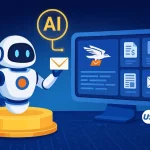In the bustling corridors of educational institutions, where knowledge is imparted and futures are shaped, there lies an often-overlooked responsibility: safeguarding the privacy of sensitive information. Educational institutions are not merely sanctuaries of learning; they are also custodians of vast amounts of personal data pertaining to students, staff, and faculty. The complexity of handling this data appropriately is magnified by stringent compliance regulations that govern every piece of mail, electronic or physical, that circulates within and outside these establishments.
We’ll dive into the critical role of mail compliance in the education sector, unraveling the intricacies of key regulations like FERPA, HIPAA, and GLBA, their profound impact on mail handling and data security, and delving into effective solutions for better handling of mail in these institutions.
Delving into the Relevant Regulations
Educational institutions must adhere to the regulations that impact how they manage electronic communications and protect student information:
- FERPA (Family Educational Rights and Privacy Act): Empowers parents and guardians with the right to access their children’s educational records. This access is crucial for maintaining transparency and trust between educational institutions and families. As students step into adulthood at 18, FERPA transitions the rights over educational records from parents to the students themselves.
- FOIA (Freedom of Information Act) and State Sunshine Laws: These laws require public educational institutions to make student records available to the public, balancing transparency with the need to protect sensitive student information.
- HIPAA (Health Insurance Portability and Accountability Act): Applies to schools that handle protected health information, imposing strict guidelines on how this data is shared and protected.
- GLBA (Gramm-Leach-Bliley Act): Affects institutions engaged in financial activities, enforcing the protection of consumer financial information.
- CAN-SPAM Act: Governs commercial email communications, setting standards for messaging transparency, opt-out mechanisms, and the protection of private email communications.
- Corporate Policies and Advertiser-Specific Requirements: Schools engaging in email marketing must also adhere to industry-specific guidelines and policies, ensuring that their communications are not only compliant but also respectful of the recipients’ privacy.

Key Challenges in Mail Compliance for Educational Institutions
Navigating the complexities of mail compliance poses a significant challenge for educational institutions. As they juggle the dual responsibilities of education and data protection, these organizations face several hurdles that can complicate the path to compliance.
Data Privacy and Security
For educational institutions, the responsibility of safeguarding student information is governed by specific regulations such as the Family Educational Rights and Privacy Act (FERPA) and the Health Insurance Portability and Accountability Act (HIPAA). FERPA protects the privacy of student education records, while HIPAA secures protected health information held by schools that provide healthcare services.
Non-compliance with these regulations can lead to severe consequences. For instance, a university that inadvertently sends out confidential student information due to a mail mishap could face legal actions, hefty fines, and damage to its reputation.
Administrative Burden
Maintaining compliance with mail regulations requires a significant administrative effort. Educational institutions must develop and enforce policies and procedures that ensure every piece of mail containing sensitive information is handled correctly. This adds a considerable burden on administrative staff, often requiring them to undergo specialized training and to stay updated with the latest compliance requirements. The workload can be overwhelming and distract from other critical educational functions.
Technological Integration
Technology plays an essential role in ensuring compliance with mail regulations. Modern educational institutions increasingly rely on electronic record-keeping and communication to manage student data securely. However, integrating these technologies poses its own challenges, such as ensuring the security of electronic data transmissions and protecting against data breaches.
Despite these challenges, the trend is towards a more integrated technological approach. Schools are adopting advanced mail management systems that automate data handling and ensure compliance through built-in security features like encryption and secure access controls. Looking forward, the role of technology in mail compliance is set to grow, promising not only more robust security but also greater efficiency in how educational institutions handle sensitive information.
Guidance for Stakeholders in Educational Compliance
Ensuring compliance with mail and data regulations in educational institutions is a collective effort that involves multiple stakeholders, each with specific roles and resources.
Educational Administrators
Educational administrators are vital in overseeing the entire compliance landscape within their institutions. They should employ compliance checklists tailored to education-specific regulations. For instance, a FERPA checklist might include items such as ensuring all student records are securely stored and only accessible to authorized personnel, and that policies for releasing information are communicated to students and parents.
Additionally, webinars and training sessions hosted by legal experts or experienced compliance professionals can provide administrators with up-to-date knowledge and practices. An example webinar might cover new amendments in HIPAA regulations and how they affect data handling in student health services.
IT and Data Security Professionals
IT and data security professionals in educational institutions are on the front lines of protecting sensitive data. Regular security audits are essential, and the right tools and protocols need to be in place to identify and mitigate potential vulnerabilities.
Regulatory Compliance Officers
Regulatory compliance officers must keep their fingers on the pulse of changing regulations. Their role involves not just understanding these changes but also adapting organizational policies to align with them. Utilizing policy templates and accessing expert insights can help these officers implement robust compliance frameworks effectively. For example, a template for a data breach response policy can be customized to fit an institution’s specific needs.
Educators and Staff
Finally, educators and staff are the everyday users of information that must be protected. They need clear and concise training on how to handle sensitive information securely. Establishing compliance communication channels, such as a dedicated hotline or email for compliance questions, ensures that staff can quickly resolve uncertainties about handling mail and sensitive data.
US Global Mail: Reliable Mail Handling Solutions
US Global Mail stands at the forefront of transforming how educational institutions handle their mail, emphasizing the reduction of junk mail and enhancing mail security. This innovative service offers solutions tailored to meet the complex needs of compliance in the education sector.
Virtual Mailboxes
Virtual mailboxes represent a significant leap in mail management. They allow for the digital receipt of postal mail, which administrators and staff can access securely online. This not only reduces the physical handling of sensitive documents but also ensures compliance by keeping a secure digital trail of all mail transactions.
Mail Scanning Services
The advantages of digital mail conversion extend beyond simple convenience. By converting physical mail to digital formats, educational institutions can enhance both security and compliance. This process minimizes the risk of sensitive information falling into the wrong hands and allows for better control and tracking of document access.
Data Security Features
US Global Mail incorporates robust data security measures such as encryption and stringent access controls. These features ensure that sensitive information remains protected both in transit and at rest, aligning with compliance regulations such as FERPA and HIPAA.
Enhancing Efficiency and Accuracy
Automated mail handling systems provided by US Global Mail significantly reduce the likelihood of errors and administrative burdens associated with manual mail processing. This not only enhances efficiency but also improves compliance accuracy, ensuring that every piece of mail is handled according to the necessary legal standards.

Future Trends and Innovations in Mail Compliance
As we look to the future, mail compliance in the education sector is poised for significant transformations, driven by technological advancements and evolving regulations.
Technological innovation is set to redefine how educational institutions handle mail and sensitive information. We anticipate the integration of AI and machine learning technologies that can automate the classification and sorting of mail, ensuring that sensitive information is processed securely and efficiently. Blockchain technology could also play a crucial role, providing immutable records of mail transactions and communications, thereby enhancing transparency and accountability in mail handling.
Regulations governing mail compliance are expected to evolve in response to these technological changes and the ever-increasing amount of data being handled by educational institutions. We foresee a tightening of data protection laws, with more stringent measures to protect student and staff information. Educational institutions will need to stay agile, continuously updating their compliance strategies to align with these regulatory changes.
Conclusion
Ensuring mail compliance in the education sector is more than a regulatory requirement; it’s a critical component of trust and safety in our educational institutions. As we’ve explored, empowering each stakeholder with the right tools and knowledge is vital for upholding the standards of data privacy and security. With the landscape of mail compliance rapidly evolving, driven by both technological advancements and shifting regulations, educational institutions must be proactive and innovative.
US Global Mail is at the forefront of this transformation, offering advanced solutions like virtual mailboxes and automated mail handling systems that enhance compliance and efficiency. Let’s continue to foster environments where compliance is part of the culture, ensuring that every piece of information is handled with the care and security it deserves. With US Global Mail, educational institutions have a robust ally in navigating the complex world of mail compliance.







